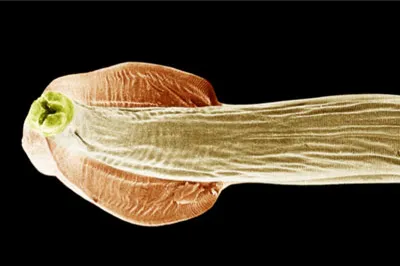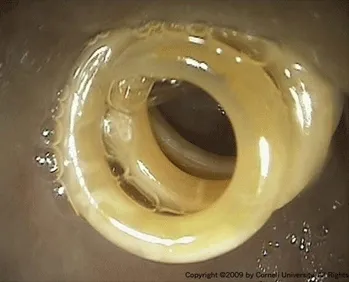Welcoming a new puppy into your home is an exciting time, filled with joy and new responsibilities. Amidst all the puppy cuddles and playful antics, it’s natural to have questions about their health, especially concerning parasites. One common concern for new pet parents is roundworms, and a frequently asked question is: Can I Get Roundworms From My Puppy? The straightforward answer is yes, humans can contract roundworms from puppies, making it crucial for every dog owner to understand the risks, symptoms, and most importantly, how to prevent transmission to both their furry friends and their family. Understanding these risks is key to maintaining a healthy environment for everyone. If you’re wondering can i catch roundworm from my dog, this article will provide essential insights into protecting your household.
Understanding Roundworms in Puppies
Roundworms (scientifically known as Toxocara canis) are among the most prevalent internal parasites found in dogs, particularly in puppies. Almost all puppies will encounter roundworms at some point in their early lives, often without their owners even realizing it initially. These parasites are easily spread and can be challenging to eradicate without consistent preventive measures.
How Puppies Contract Roundworms
The ease with which roundworms spread is a major concern. Puppies can be infected in several ways:
- Transplacentally: Often, a pregnant mother dog can pass roundworm larvae to her unborn puppies while they are still in her uterus. This means puppies can be born already infected.
- Transmammary: After birth, puppies can also ingest worm larvae through their mother’s milk while nursing.
- Environmental Exposure: Puppies are naturally curious and explore their surroundings by sniffing and licking. They can easily ingest larvated eggs present in contaminated soil or feces from other infected animals.
- Ingestion of Prey: Roundworm larvae can reside in the tissues of small mammals like mice. If a puppy hunts and eats an infected animal, they can contract the worms.
Recognizing Roundworm Symptoms in Your Puppy
Many dogs, especially adults, may not show obvious signs of roundworm infection. However, puppies, with their less developed immune systems, are more vulnerable and often exhibit noticeable symptoms, particularly with heavy infestations.
Here’s what to look out for:
- Potbellied Appearance: This is one of the most classic signs, where a puppy’s belly appears distended or swollen.
- Dull Coat: A healthy puppy should have a shiny, vibrant coat. A dull, dry, or brittle coat can indicate poor nutrition due to parasites.
- Diarrhea and Vomiting: Digestive upset is common. You might even see adult roundworms in your puppy’s feces or vomit. These worms are typically white or light brown, several inches long, and resemble spaghetti. If you’re concerned about digestive issues, you might also wonder can worms cause a dog to have diarrhea.
- Weight Loss or Poor Growth: Despite eating well, an infected puppy may fail to gain weight or appear underweight because the worms are stealing vital nutrients.
- Coughing: In some cases, roundworm larvae migrate through the lungs, which can trigger a cough.
 Anterior view of Toxocara canis, a common canine roundworm.
Anterior view of Toxocara canis, a common canine roundworm.
The Risk to Humans: Can You Get Roundworms From Your Puppy?
This brings us back to our central question: can I get roundworms from my puppy? Yes, roundworms from puppies (and adult dogs) pose a significant public health risk, particularly to children. This is a zoonotic disease, meaning it can be transmitted from animals to humans.
How Human Infection Occurs
Humans do not become infected by direct contact with the adult worms themselves, but rather by ingesting microscopic roundworm eggs. These eggs are passed in the feces of an infected puppy and can survive in the environment for months, even years.
- Contact with Contaminated Soil: Roundworm eggs accumulate in soil where infected pets defecate. If humans, especially children, play in this soil and then touch their mouths without proper handwashing, they can ingest the eggs.
- Contact with Dog Feces: Direct handling of dog feces without gloves, or inadequate handwashing after cleaning up pet waste, can lead to the ingestion of eggs.
- Contaminated Surfaces: Eggs can also be tracked into homes on shoes or paws, contaminating carpets and other surfaces.
Symptoms of Roundworm Infection in Humans
Once ingested, the roundworm larvae hatch and can migrate throughout the human body, causing a condition known as Visceral Larva Migrans (VLM) or Ocular Larva Migrans (OLM). These conditions can be serious:
- Visceral Larva Migrans (VLM): Larvae travel to internal organs (liver, lungs, heart, brain), causing inflammation, fever, coughing, and abdominal pain.
- Ocular Larva Migrans (OLM): Larvae migrate to the eyes, potentially causing vision loss in one eye. In rare but severe cases, neurological signs can also occur if larvae reach the brain. If you’re concerned about transmission, it’s important to understand if my dog has roundworm will i get it.
Preventing Roundworm Transmission to Both Pets and People
The good news is that preventing roundworm infection in your puppy and its transmission to humans is highly achievable through consistent hygiene and veterinary care.
Puppy Deworming Schedule
The most effective way to protect your puppy and your family is through a regular deworming schedule, guided by your veterinarian.
- Early Treatment: Puppies should typically be dewormed starting at 2, 4, 6, and 8 weeks of age. This frequent schedule is necessary because of the various ways puppies can become infected and the lifecycle of the worm.
- Monthly Prevention: After the initial puppy deworming series, they should receive monthly preventive treatments, often combined with heartworm prevention, to maintain protection.
- Fecal Examinations: Regular stool (fecal) examinations are crucial. These should be conducted 2 to 4 times during the first year of a puppy’s life and 1 or 2 times annually for adult dogs.
- Nursing Mothers: Nursing mothers should also be kept on a monthly preventive and treated alongside their puppies to minimize the risk of transmission to their litter.
 A visual of Ascarids (roundworms) within the intestine.
A visual of Ascarids (roundworms) within the intestine.
Maintaining Hygiene and Protecting Your Family
Beyond deworming, environmental hygiene plays a critical role in preventing roundworm spread:
- Clean Living Environment: Regularly clean and disinfect your puppy’s living areas. Roundworm eggs are resilient, so thorough cleaning is essential.
- Prompt Feces Removal: Immediately pick up and dispose of your dog’s feces, both indoors and outdoors. This is the single most important step in preventing environmental contamination.
- Discourage Eating Wild Animals: If possible, prevent your puppy from eating mice, birds, or other small wild animals that may carry roundworm larvae.
- Handwashing: Always wash your hands thoroughly with soap and water after playing with your puppy, handling their feces, or gardening.
- Children and Contaminated Areas: Do not allow children to play in areas where animals have frequently defecated or in potentially contaminated soil. Supervise young children carefully when they interact with puppies and encourage good hand hygiene.
- Gardening Safety: Individuals who have direct contact with soil (e.g., gardeners) should wear gloves to minimize exposure.
The Role of Your Veterinarian
Your veterinarian is your best resource for protecting your puppy and your family from roundworms. They can recommend the most appropriate prevention and treatment choices, including comprehensive heartworm preventives that often also control roundworms and other intestinal parasites. They can also advise on other parasite concerns, such as flea and ear mite treatment for dogs. Regular veterinary check-ups and open communication about your puppy’s health and lifestyle are vital for a long, healthy life together.
Conclusion
The question, “can I get roundworms from my puppy?” underscores a valid concern for any responsible pet owner. While the risk of human transmission is real, especially for children, it is largely preventable. By understanding how puppies contract roundworms, recognizing the symptoms of infection, and diligently following a consistent deworming schedule combined with strict hygiene practices, you can significantly reduce the risk to both your beloved puppy and your family. Always partner with your veterinarian to establish the best preventive care plan for your puppy, ensuring a happy, healthy, and safe environment for everyone in your home.
References
- Companion Animal Parasite Council (CAPC): For veterinary professionals, more detailed information on ascarids (roundworms) can be found at https://www.capcvet.org/guidelines/ascarid/.
